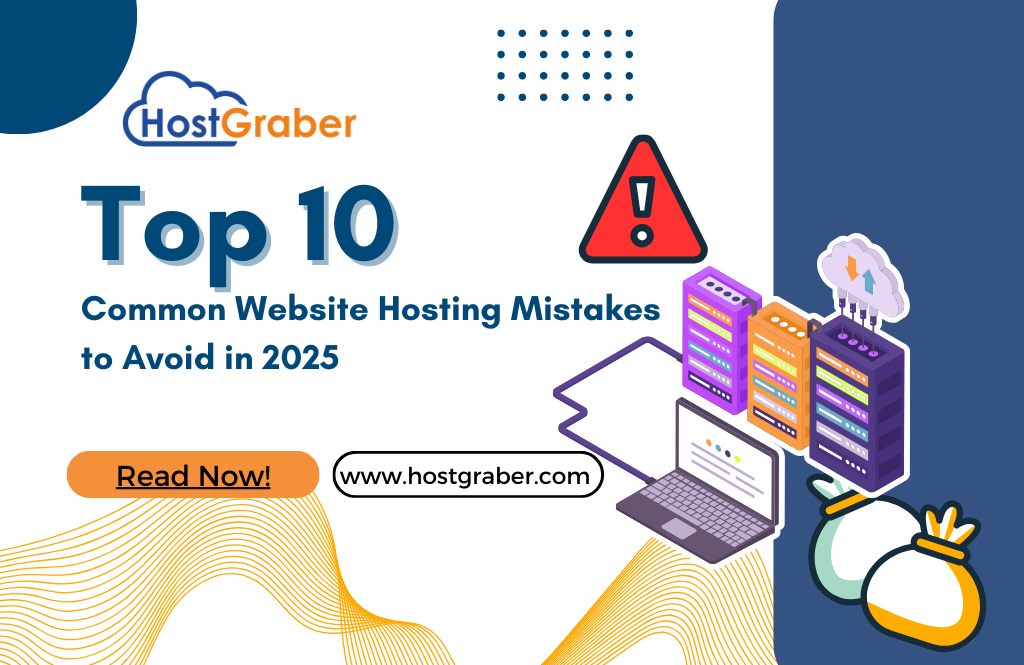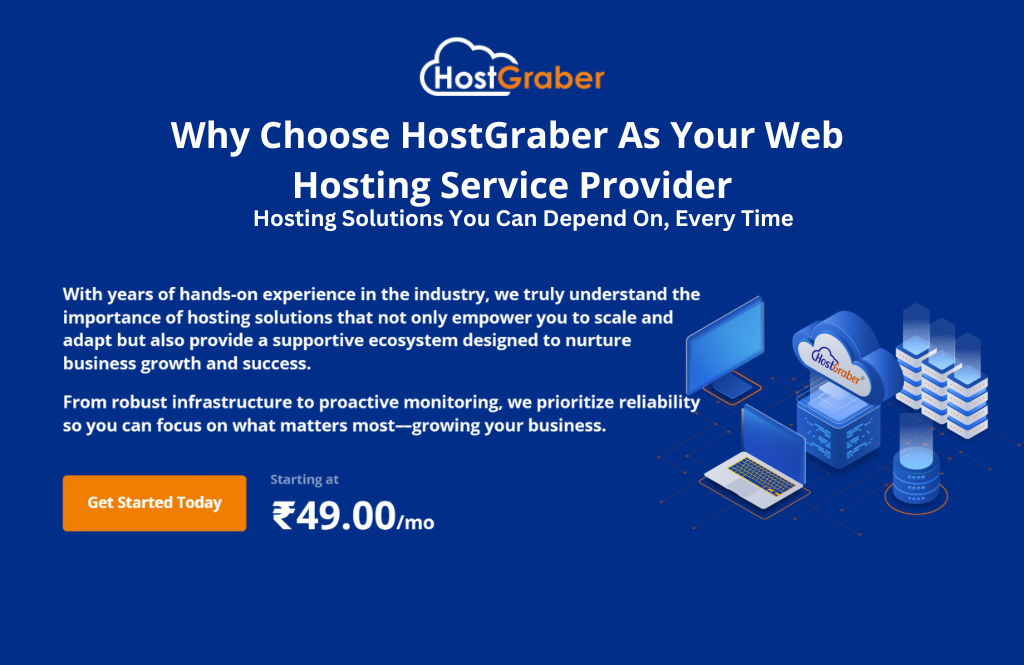Starting an online business in today’s competitive world comes with a lot of decisions, and one of the most important ones is selecting the right web hosting for your website. For startups, this choice hugely impacts the presence of their business in digital world. How? Your website is the first impression of your brand and often the main platform where you engage with your customers. No matter how beautiful your website design is, if the foundation is weak, the entire structure is at risk. Imagine losing customers because your website is slow, down, or hacked—it’s a nightmare no business wants to experience. Customers expect websites to load in seconds, be available 24/7, and keep their data safe. This makes it essential for startups to understand what to look for in a hosting provider and avoid common pitfalls.
Whether you’re launching your first website or scaling an existing one, understanding the intricacies of web hosting is essential. From selecting the right hosting type to prioritizing uptime guarantees, security features, and customer support, every decision counts.
Let’s explore how startups can avoid common hosting mistakes and make informed choices to build a solid foundation for online success. Plus, we’ll share some actionable tips to help you choose the best hosting solution for your needs.
Let’s ensure your startup gets off to the right start online!
Top 10 Common Website Hosting Mistakes to Avoid in 2025:
1. Choosing the Cheapest Option Without Considering Quality:
When selecting a web hosting provider, one common mistake website owners make is focusing solely on the cheapest option without evaluating its quality. While a low price tag may seem appealing, it often comes at the cost of essential features like performance, reliability, and support. Cheap hosting plans typically offer limited resources, leading to slow website speeds, frequent downtimes, and poor scalability as your site grows. Moreover, such providers might lack robust security measures, leaving your website vulnerable to cyberattacks. In today’s digital arena, where users expect 24/7 fast load times and seamless browsing, these issues can seriously harm your credibility and drive potential customers away. Instead of prioritizing cost alone, choose a hosting provider that delivers value for money—one that combines affordability with excellent uptime guarantees, fast servers, 24/7 customer support, and the ability to scale as needed.
Investing in quality hosting now is a smart move to future-proof your online presence.
Solution: Focus on value and not just price. You should look for hosting providers that offer a balance of affordability and essential features like sufficient storage, bandwidth, uptime guarantees, and reliable customer support.
2. Ignoring Website Speed:
Ignoring website speed is like turning customers away before they even step inside your store. Users expect websites to load within seconds. A slow website not only frustrates visitors but also affects your search engine rankings, making it harder for people to find you. Slow loading times can lead to high bounce rates and lost conversions. Studies show that even a one-second delay in loading time can lead to a significant drop in conversions. This means fewer customers, less engagement, and missed opportunities for your business. Additionally, search engines like Google prioritize faster websites, so if your site is slow, you’re losing visibility to competitors. With web hosting playing a crucial role in speed, choosing a reliable host is essential. Don’t let a slow website hold you back—invest in the right hosting plan and optimize your site to keep visitors happy and your business growing.
Afterall, Speed matters more than ever in the online world!
Solution: Choose a hosting provider with fast servers, SSD storage, and content delivery networks (CDNs). Optimize your website’s code and images to further improve loading speeds.
3. Not Checking for Server Location:
When choosing a web hosting provider, many people overlook the importance of server location. This can be a big mistake. Server location plays a key role in website speed and performance. If your target audience is in India but the server is located in the US, your website might load slower for your visitors. This can hurt user experience and even affect your SEO rankings. Search engines like Google consider website speed as an important factor for ranking. Always check where the servers are located and choose a hosting provider with servers close to your audience. Moreover, data privacy concern also comes in play. If your business operates in India, choosing a hosting provider with servers in compliance with local data protection laws, like India’s Data Protection Bill, ensures faster website speeds and greater data security. Many trusted web hosting providers offer multiple server locations, allowing you to choose one close to your audience while prioritizing privacy. A simple check on server location can make a big difference in how fast and efficiently your website performs for your visitors.
Don’t let distance slow down your business!
Solution: Choose a hosting provider with servers located close to your target audience.
4. Neglecting Customer Support:
Neglecting customer support can be a big mistake for any new entrepreneur or startup. When issues arise, whether it’s a website going down or a technical glitch, quick and reliable support can make all the difference. Bad customer support can lead to delayed problem resolution, lost customers, and missed opportunities. Imagine your website going down during a big sale, and you can’t reach anyone for help—that’s a disaster! As a startup, every minute counts, and downtime can hurt your reputation. That’s why choosing a web hosting company that offers 24/7 customer support is crucial. Look for a host that provides multiple support channels like live chat, email, and phone, ensuring you’re never left stranded. A hosting provider that values customer service becomes more than just a vendor—they become a partner in your growth.
After all, your customers expect the same from you!
Solution: Choose a hosting provider that offers 24/7 customer support through multiple channels (e.g., phone, email, live chat). Check online reviews to gauge the quality of their support.
5. Not considering Tech Support:
Tech support plays a critical role in the web hosting field because it directly impacts the user experience and the reliability of hosted websites. When businesses or individuals rely on a hosting provider, they expect their websites to run smoothly 24/7. However, technical issues like server downtime, slow loading speeds, security breaches, or email configuration errors can arise at any time. This is where efficient tech support becomes crucial.
A knowledgeable and responsive tech support team helps clients resolve these issues quickly, minimizing disruptions and ensuring that websites remain accessible to users. Good support builds trust, boosts customer satisfaction, and encourages long-term loyalty. Moreover, hosting providers with strong tech support gain a competitive edge by showing that they prioritize their clients’ needs.
Where reliability and uptime are non-negotiable elements, then tech support acts as the primary element for your digital success.
Solution: Choose a hosting provider that offers 24/7 tech support through multiple channels (e.g., phone, email, live chat). Check online reviews to gauge the quality of their support.
6. Ignoring Uptime Guarantees:
When choosing a web hosting provider, one crucial factor you should never overlook is the uptime guarantee. Uptime refers to the amount of time your website stays online and accessible to users. Ignoring this can lead to frequent website downtimes, which means lost visitors, reduced credibility, and even revenue loss for your business. Think about it—would you trust a store that’s always closed when you visit? The same logic applies to websites. A reliable hosting provider will offer an uptime guarantee of at least 99.9%, ensuring your website stays live almost all the time. Before signing up for a hosting plan, always check their uptime promise and look for customer reviews to confirm their reliability.
A few minutes of research can save you from hours of frustration later.
Solution: Prioritize hosting providers with strong uptime guarantees and transparent uptime monitoring. Check independent reviews and testimonials to verify their claims.
7. Not Considering Scalability:
When starting a website, many people focus only on their current needs, forgetting to plan for future growth. This is where scalability becomes important. Scalability in web hosting means your hosting plan can handle increased traffic, data, or features as your website grows. If you choose a hosting provider that doesn’t offer scalable solutions, you might face slow loading times, frequent crashes, or even complete downtime when your traffic spikes. This can hurt your reputation and lead to lost opportunities. Imagine running a successful online sale, only for your website to crash because your hosting couldn’t keep up! To avoid this, always opt for a hosting service that offers flexible plans and resources you can upgrade as needed.
By considering scalability from the start, you’re not just preparing for growth—you’re setting your website up for long-term success.
Solution: Opt for hosting solutions that offer easy scalability. Cloud hosting and VPS hosting are excellent options for startups as they allow you to easily increase resources as needed.
8. Overlooking Security Features:
Cyberattacks can compromise your data, damage your reputation, and lead to legal issues. Overlooking security features when choosing a web hosting provider can lead to serious consequences for your website. Imagine putting in all your hard work to build a website, only to see it get hacked or compromised. Security isn’t just an add-on but a necessity. A reliable hosting provider should offer features like SSL certificates, firewalls, malware scans, and regular backups to keep your data safe. Without these protections, your website is vulnerable to cyberattacks, data breaches, and downtime, which can damage your reputation and cost you money. Think of it like locking the doors of your home – you wouldn’t leave them open, right? Similarly, securing your website ensures peace of mind for you and trust for your visitors. So, before choosing a hosting provider, always check the security features they offer.
A little attention now can save you from big troubles later.
Solution: Look for hosting providers that offer robust security features like SSL certificates, firewalls, malware scanning, and regular backups.
9. Not Understanding Different Hosting Types:
There are various types of web hosting, each with its own advantages and disadvantages. Choosing the wrong type of hosting can impact your website’s performance. Choosing the right web hosting type can feel confusing, but it’s one of the most important decisions for your website’s success. Many beginners don’t realize that there are different hosting options, each designed for specific needs. For example, shared hosting is great for small websites or blogs, while VPS hosting offers more control and resources for growing businesses. Dedicated hosting gives you an entire server for maximum performance, and cloud hosting provides flexibility and scalability. Without understanding these differences, you might end up with a hosting plan that doesn’t meet your website’s requirements, leading to slow loading speeds, crashes during high traffic, or unnecessary expenses. Take the time to learn about the hosting types and assess your website’s needs before making a choice.
The right hosting ensures your website runs smoothly, keeps visitors happy, and supports your growth.
Solution: Understand your website’s needs and choose the appropriate hosting type. For most startups, shared hosting is a good starting point, but consider VPS or cloud hosting as your business grows.
List of different types of hosting:
Shared Hosting
- Best for – Small websites, blogs, and beginners
- Features – Shared resources with other websites on the same server
- Advantages – Affordable, easy to set up, beginner-friendly
- Disadvantages – Limited resources, slower during high traffic
- Cost – Low
WordPress Hosting
- Best for – WordPress-based sites
- Features – Optimized for WordPress with pre-installed plugins and security features
- Advantages – Customized for WordPress, enhanced performance
- Disadvantages – Limited to WordPress sites
- Cost – Low to Medium
VPS Hosting
- Best for – Growing business websites, medium traffic
- Features – Virtual private server with dedicated resources
- Advantages – Better performance, more control than shared hosting
- Disadvantages – Requires server management skills
- Cost – Medium
Dedicated Hosting
- Best for – Large, high-traffic websites
- Features – Entire server dedicated to one user
- Advantages – Maximum performance, full control over server
- Disadvantages – High cost, requires technical expertise
- Cost – High
Cloud Hosting
- Best for – Growing businesses, scalable websites
- Features – Websites hosted across multiple servers (cloud network)
- Advantages – Highly scalable, reliable, pay-as-you-go model
- Disadvantages – Can get expensive as usage scales
- Cost – Medium to High
Node.Js Hosting
- Best for – Web apps, JavaScript-based projects
- Features – Supports Node.js runtime for server-side JavaScript applications
- Advantages – Suitable for real-time applications, scalable
- Disadvantages – Requires technical knowledge
- Cost – Medium to High
WooCommerce Hosting
- Best for – Online stores using WooCommerce
- Features – Optimized for WooCommerce with features like pre-installed WooCommerce, SSL, and caching tools
- Advantages – Great for eCommerce, fast loading speeds, secure
- Disadvantages – Limited to WooCommerce stores
- Cost – Medium
10. Forgetting About Backups:
Forgetting about backups is one of the biggest mistakes you can make when managing a website. What if you lose all your hard work, important data, and customer information because of a server crash, a cyberattack, or even a simple human error. Backups are like a safety net for your website – they protect you from the unexpected. Without regular backups, you risk losing months or even years of progress in just a moment. The good news is that creating backups is easier than ever, with many hosting services offering automated backup solutions. By setting up regular backups, you ensure that your website can be quickly restored if something goes wrong.
Don’t wait for a disaster to remind you of backups importance.
Solution: Ensure your hosting provider offers automatic backups and provides easy access to restore your website.
10. Not Reading the Terms of Service:
One common mistake many people make when signing up for web hosting services is not reading the Terms of Service (ToS). While it may seem like a time-consuming task, skipping this important step can lead to unwanted surprises. The Terms of Service outline the rules, responsibilities, and limitations of both the web hosting provider and the customer. Not reading them means you may unknowingly agree to conditions that could impact your website or business, such as hidden fees, data storage limitations, or even service termination under certain conditions. To avoid these issues, it’s essential to take the time to go through the ToS carefully. Doing so ensures that you are fully aware of what to expect from your web hosting provider and can help you make an informed decision that suits your business needs.
Understanding the ToS is key to a smooth and hassle-free hosting experience.
Solution: Carefully read the terms of service to avoid any surprises later.
Few Web Hosting Tips for Startups in 2025:
1. Start Small, Scale Up: Begin with a shared hosting plan if you have a small website and limited traffic. Upgrade to VPS or cloud hosting as your business grows.
2.Prioritize Security: Invest in SSL certificates, malware scanning, and other security measures to protect your website and data.
3.Optimize for Mobile: Ensure your website is mobile-friendly and loads quickly on mobile devices.
4.Monitor Website Performance: Use website analytics tools to track website speed, uptime, and other key metrics.
5.Stay Updated: Keep your website software and plugins updated to patch security vulnerabilities and improve performance.
Conclusion:
Selecting the right web hosting provider is a pivotal decision for startups. It goes beyond just having a website online—it’s about creating a strong, reliable foundation that will support your business as it grows. By following the tips and avoiding common mistakes highlighted in this guide, you can ensure that your website runs smoothly, remains secure, and loads quickly, providing a better user experience. This not only helps in retaining customers but also improves your search engine rankings.
A well-chosen web host can support the scalability of your business, making it easier to handle increased traffic as your startup grows. Take the time to research your options, considering factors like customer support, uptime guarantees, and scalability. A smart, informed choice now can save you headaches and expenses in the future, giving you the freedom to focus on growing your business rather than dealing with technical issues.




